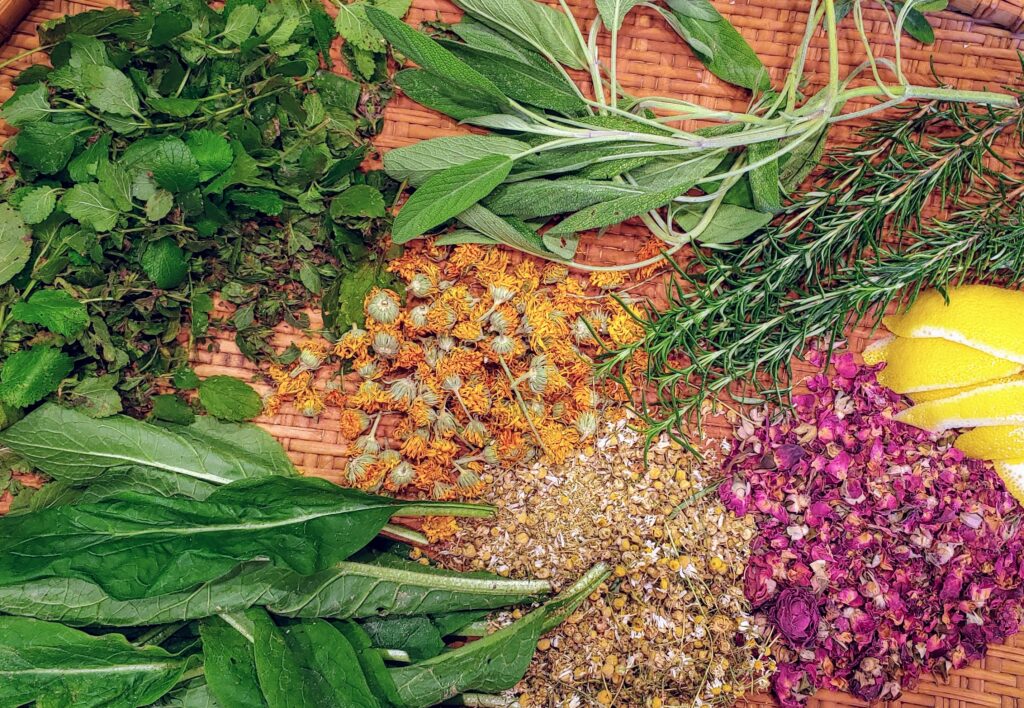![]() As Fire Cider recipes float from Facebook group to newsletters to personal feeds, I have another “vinegar recipe” that takes a substantial role in my family’s skin and hair health.
As Fire Cider recipes float from Facebook group to newsletters to personal feeds, I have another “vinegar recipe” that takes a substantial role in my family’s skin and hair health.
This recipe is important during seasonal transitions as our complexions tend to have issues with weather, food, and stress changes.
The modern recipe attributed to Rosemary Gladstar supposedly “invented by gypsies” is called “Hungary or Queen of Hungary Waters.”The origin story is a mixture of history, facts, myths and legends surrounding an aging Queen of Hungary (1305-1381) who needed a potion to cure her rheumatisim and to give her back her lost beauty. An alchemist in the court supposedly created a recipe (considered the world’s first alcoholic perfume) that was so remarkable that a young Grand Duke (in his 20s) asked for her hand in marriage (in her 70s). The recipe was SO special that is was written in the Queen’s hand in golden ink.
![]() From my research, I could only reach back to Culpepper for a notation of the original recipe where he stated, “The water (containing an infusion of spirits, vinegars, rose waters, and such) is admirable cure-all remedy of all kinds of cold and humidity-induced head ailments, apoplexies, epilepsies, dizziness, lethargy, crippleness, nerves diseases, rheumatism, flaws, spasms, loss of memory, coma, drowsiness, deafness, ear buzzing, derangement of vision, blood coagulation, mood-induced headaches. Relieves toothache, useful for stomach cramps, pleuritis, lack of appetite, indigestion, obstruction of the liver, obstruction of the spleen, intestinal obstruction and contraction of the uterus… There are not many remedies producing that many good effects.”
From my research, I could only reach back to Culpepper for a notation of the original recipe where he stated, “The water (containing an infusion of spirits, vinegars, rose waters, and such) is admirable cure-all remedy of all kinds of cold and humidity-induced head ailments, apoplexies, epilepsies, dizziness, lethargy, crippleness, nerves diseases, rheumatism, flaws, spasms, loss of memory, coma, drowsiness, deafness, ear buzzing, derangement of vision, blood coagulation, mood-induced headaches. Relieves toothache, useful for stomach cramps, pleuritis, lack of appetite, indigestion, obstruction of the liver, obstruction of the spleen, intestinal obstruction and contraction of the uterus… There are not many remedies producing that many good effects.”
This preparation is in fact an herbal extract, a tincture for which apple cider vinegar has been used as a solvent to extract the essential compounds of the herbs. Cosmetic vinegars, also called, toilet vinegars, have been an indispensable complexion aid for centuries.
![]() Able to close pores and preserve or restore the skin’s natural acidity, or proper pH balance, vinegars keep oily and dry complexions soft and fresh.
Able to close pores and preserve or restore the skin’s natural acidity, or proper pH balance, vinegars keep oily and dry complexions soft and fresh.
![]() Vinegar tonics are much better for the skin than most commercial tonics because the latter usually contain drying alcohol. They also combat the ravages of alkaline soaps and makeup.
Vinegar tonics are much better for the skin than most commercial tonics because the latter usually contain drying alcohol. They also combat the ravages of alkaline soaps and makeup.
![]() And, depending upon the herbs infused in the vinegar, tonics can heal tone, soothe or soften the skin in both women and men. They can also keep acne at bay, improve circulation, reduce broken veins and capillaries, smooth our wrinkles and bleach freckles.
And, depending upon the herbs infused in the vinegar, tonics can heal tone, soothe or soften the skin in both women and men. They can also keep acne at bay, improve circulation, reduce broken veins and capillaries, smooth our wrinkles and bleach freckles.
![]() For me, I have adjusted my recipe to include several additional herbs (and essential oils) that help with my family’s specific skin and hair care needs.The modern recipe that can be found throughout the internet combines gentle common herbs in a masterful way, it’s easy to make, and it’s a versatile formula that serves many purposes. It can be used as a hair rinse, mouthwash, headache remedy, aftershave, footbath, and who knows what else!Before I started making my own, I purchased it on Etsy for a “pretty penny.”
For me, I have adjusted my recipe to include several additional herbs (and essential oils) that help with my family’s specific skin and hair care needs.The modern recipe that can be found throughout the internet combines gentle common herbs in a masterful way, it’s easy to make, and it’s a versatile formula that serves many purposes. It can be used as a hair rinse, mouthwash, headache remedy, aftershave, footbath, and who knows what else!Before I started making my own, I purchased it on Etsy for a “pretty penny.”
- 6 parts lemon balm
- 4 parts chamomile
- 4 parts roses
- 3 parts calendula
- 3 parts comfrey leaf
- 1 part lemon peel
- 1 part rosemary
- 1 part sage
- Vinegar to cover (apple cider or wine vinegar)
- Rose water or witch hazel extract
- Essential oil of lavender or rose (optional)
- Place the herbs in a wide mouthed jar. Fill the jar with enough vinegar that it rises an inch or two above the herb mixture. Cover tightly and let it sit in a warm spot for 2 to 3 weeks.
- Strain out the herbs. To each cup of herbal vinegar, add 2/3 to 1 cup of rose water or witch hazel. Add a drop or two of essential oil, if desired. Rebottle. This product does not need to be refrigerated and will keep indefinitely – however, I do. I also dilute 1/4 cup of the waters to 1 quart distilled water for a wonderful hair rinse.
![]() Enjoy! And, share with us how you adapt this recipe for your own family.
Enjoy! And, share with us how you adapt this recipe for your own family.

